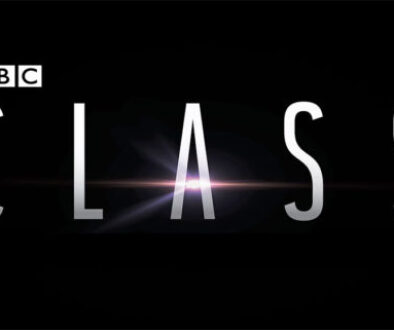Class: Ep 7 “The Metaphysical Engine, or What Quill Did” Review
Clint Hassell gives his verdict on the seventh episode of Doctor Who’s new spin-off.

Note: this review contains full spoilers for the seventh episode, available on BBC3 now.
“The Metaphysical Engine, or What Quill Did” suffers from the same problem as Series 8’s “Time Heist,” namely that, without a defined list of objectives outlined for the audience, it is difficult to be invested in the heist plot. The episode does contain some moments of brilliance – – Lore Hell is a place where shapeshifters are frozen for eternity; accomplishing the “impossible task” of unlocking Ballon’s shapeshifting potential can only be done in an “impossible place” – – and, in fairness, the heist caper format spreads these moments throughout the story. However, the resulting episode forces the viewer to be spoon-fed plot advancement, rather than be emotionally engaged, as, at every location, Quill must crankily demand where they are.
This isn’t necessarily a bad thing, as the episode reveals information to both Quill and the audience at the same time, allowing the viewer to better empathize with Quill. However, Quill herself seems barely invested in her adventure, as she is scripted with an overabundance of witty retorts. Ostensibly, much of this is to increase the entertainment value of an episode that lacks much action – – where three characters spend most of the episode in isolated locations, talking. Unfortunately, rather than reveal Quill’s true, inner nature via her reactions to the episode’s impossible situations, writer Patrick Ness fills the script with Quill’s acerbic humor. While Quill’s quips are the highlight of many previous episodes, to have so many here stunts the episode’s effectiveness. For example, Ballon’s line, “I’m about to do a sacred thing,” contains a cultural reveal layered with potential, but the line is followed by another of Quill’s sarcastic responses, “Oh, great, just do it quick!” It’s understandable that Class would tone down the gruesome details of this scene, but actress Katherine Kelly’s line delivery doesn’t convey excruciating pain. In the episode’s final scene, Quill’s retort, “You can’t even handle detention right,” undercuts her character’s renewed desire for vengeance. This episode needed to reveal the layers of Quill’s character hidden underneath her bitterly sarcastic exterior, but the script’s reliance on one-liners do the titular character few favors.
In fact, “The Metaphysical Engine, or What Quill Did” actually reveals how Quill’s constant barrage of witty retorts has been problematic to the definition of her character throughout the series as a whole. It is confirmed in the episode that Quill’s lover died fighting the oppression of the Rhodian government, and not the invading Shadow Kin. This is a monumental revelation, as it separates the fury Quill feels as a citizen of Rhodia, having seen her entire planet decimated, and her rage at the Rhodian government for her enslavement and the death of her lover. Quill’s comic relief role in Class has muddled these two separate responses into one sense of general anger, the weight of Quill’s plight buoyed by her pithy humor. Only now, in the series penultimate episode, does Quill feel anything more than inconvenienced by Charlie.
The rest of episode’s characters are written as equivalently one-dimensional. Anes continues to deliberately obfuscate, covering her secret plans with a layer of distraction, answering Quill’s continuous question, “Where are we?” with non-answers like, “Someplace wonderful,” or “You wouldn’t believe me.” There’s a difference between an intentionally cryptic character and the unrealistic withholding of information being the only reason the plot moves forward. For every time Anes’ presence adds to a scene – – for example, barking orders for Quill to recall memories of her childhood, the only sense of excitement in the first of two scenes that, for some reason, actually refrain from showing the procurement of either necessary item – – her involvement derails another – – just as Quill begins to believe in the possibility of a life apart from the Arn, Anes awakens, stopping the conversation.

Ballon is similarly shallow, a surrogate for Quill that is a bit too on-the-nose. Both come from planets attacked by an unstoppable enemy; both lost everything, including family. Both are trapped on Earth, in fates they consider worse than death – – he frozen in one form, she in service of Charlie. Ballon’s story paints him in a sympathetic light – – he came to Earth, seeking shelter with UNIT – – but the goodwill his story engenders in the audience doesn’t transfer to Quill, as only Ballon killed in self-defense. Further, every argument about the unfairness of Quill’s situation that is touched upon via her parallels with Ballon has already been voiced by both Tanya and Quill herself, in earlier episodes, reducing Ballon to a stock, necessary-for-plot-only character. This is particularly unfortunate as the episode misses an opportunity to analyze Quill’s quote from Warsan Shire’s “Home” and offer more than rudimentary commentary on real-life refugee crises.

In fact, “The Metaphysical Engine, or What Quill Did” doesn’t really come alive until Quill is inexplicably able to physically attack her god, and confront Her for not protecting the Quill race from hundreds of years of oppression. The episode barely touches on the definition of belief and how “belief” differs from the unnamed concept of “faith,” i.e., belief in the absence of proof. Both Ballon and Anes have faith, not belief, but the episode does little more than hint at the inherent philosophical debate, or how it shades Quill as a character, by comparison.
This is especially frustrating, as Quill is healed at the episode’s two-thirds mark, resulting in a fourth act that is the definition of “filler.” Once healed, Quill has sex with Ballon, the episode restating that the two are mirrored via the heavy-handed symbolism of their scars and discussion of “the forms they wear.” Yet another of Quill’s droll retorts reiterates that she is still a woman with desires, material previously presented in “The Coach With the Dragon Tattoo.”
While the reveal that Anes does not disclose their final destination as the interior of the cabinet of souls for fear of Quill’s reaction seems sensible, not only does the final location not add appreciably to the episode beyond extending it to the 45-minute length required for broadcast, it creates several problems. Yes, the cabinet provides Quill a means of transportation back to the physical realm, but that is only necessary because the script hints that Anes’ mystical engine has died. Further, this “solution” is nonsensical as Quill does not know the way out of the cabinet, and, ostensibly, must rely on the Rhodian souls to guide her. Why would they help her, after they threatens to defile their memory and kill the last of their kind? Would not a more logical solution have been for her to spend “years” finding her own way out, and that be the reason for her longer hair and disheveled appearance? Instead, the time jump is portrayed as the impetus for Quill wanting to claim vengeance on Charlie, literally seizing her destiny like she did the glowing filament of Rhodian soul. What viewer didn’t think that was Quill’s plan of action, after her conversation with Ballon, in the Quill goddess’ nest? The time jump accomplishes nothing except to add mystery to the final scene of “Detained,” and to restate Quill’s already obvious motives. One could argue that Quill’s true desire to take revenge on Charlie has been shrouded by the influence of the Arn – – a plot device necessary for Ness’ just punishment versus slavery debate – – and that this is Ness’ way of ensuring that the audience is clear as to Quill’s true motives going into the finale, but that is the definition of an author course-correcting, after having painted himself into a proverbial corner.

Is Quill Class’ true villain? Has Ness hidden her in plain sight, all along? This certainly seems possible – – note that Quill refers to “my power . . . my toughness and my danger” as “the central part of who [she is]” – – and opens the scope of the series, with Quill now posing an actual threat to Charlie.
Can Ness capitalize on Class’ ambitious narrative in the finale? The Shadow Kin have yet to be defeated, and April must get her heart back from Corakinus. The Governors’ plan for creating some sort of concrete new world order from their metaphysical beliefs must not only be divulged, but implemented, suffered from, and then overcome. Quill’s plan must be revealed, stopped, and her character arc completed. And, we probably have to kill Matteusz. All in 45 minutes. Sounds impossible, no? Perhaps, Ness is planning to leave plot threads dangling in anticipation of a theoretical Series 2. If that is the case, which are the critical plotlines most in need of a satisfying conclusion, considering the impressive scope of Series 1’s narrative arc?







